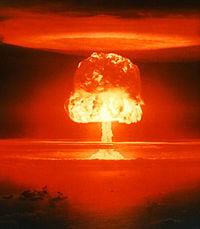Iran and the P5+1 powers remain far from a deal as the nuclear negotiations deadline looms. The US Senate will wait until after the deadline to consider its next steps regarding sanctions.
Centrifuges and sanctions appear to be the main sticking points in the Iranian nuclear negotiations as the March 31 deadline looms. A series of anonymous statements by involved diplomats strongly suggests that the negotiations may fall apart as Iran insists on rapid removal of sanctions and only a weak monitoring protocol for its nuclear program.
The latest round of negotiations between Iran and the P5+1 began Thursday morning, as United States energy secretary Ernest J. Moniz met with Ali Akbar Salehi, head of Iran’s nuclear program. The meeting was followed by others between US Secretary of State John Kerry, EU political director Helga Schmid, and Iranian Foreign Minister Javad Zarif.
A major area of disagreement is how Iranian compliance with the agreement will be verified. The US and Europe support a phased removal of sanctions once the International Atomic Energy Agency confirms that Iran has suspended its nuclear program. However, the inspection process could take several years, and Iran has long demanded that all sanctions against it be repealed as soon as a deal is reached. The current compromise appears to be that the US and EU will lift some but not all of its sanctions early to reward Iran for signing an agreement.
The number of centrifuges Iran would be allowed to maintain is also a source of contention. Western sources have hinted in recent weeks that Iran would be allowed to keep 6,000 centrifuges, a significant share of its nuclear structure, if it would ship most of its uranium stockpile to Russia.
The parties still strongly disagree on what sort of research and development Iran would be permitted to carry out. Iran insists that its nuclear program is purely civilian, and that restricting centrifuge R&D would force it to rely on outdated technology. According to the Iranians themselves, the latest generation of centrifuges they have developed are 3 to 5 times more efficient, so that allowing Iran to continue working on its nuclear technology would dramatically reduce the breakout time to a nuclear bomb.
The US Congress, meanwhile, remains highly skeptical of the negotiations process. Senator Bob Corker, chairman of the Foreign Relations Committee, and Senator Robert Menendez, the leading Democrat on the committee, have introduced a bill that would require President Barack Obama to seek Congressional approval for any deal with Iran and would increase sanctions against Iran if a deal is not reached.
The Senate committee heads issued a joint statement saying that they would wait until mid-April to mark up the bill in order not to prejudice the ongoing negotiations and to increase support for it.
Sign the Petition to Stop a Nuclear Iran

The US Congress must ensure that sanctions against Iran remain in force until the nuclear threat is completely eliminated.
I strongly oppose easing sanctions before the nuclear threat from Iran has been eliminated. Allowing Iran to enrich uranium without being subject to 'anytime, anywhere' inspections is extremely dangerous and unacceptable. Iran's nuclear program must be stopped.
CLICK HERE TO SIGN THE PETITION TO STOP IRAN
Do You Love Israel? Make a Donation - Show Your Support!
Donate to vital charities that help protect Israeli citizens and inspire millions around the world to support Israel too!
Now more than ever, Israel needs your help to fight and win the war -- including on the battlefield of public opinion.
Antisemitism, anti-Israel bias and boycotts are out of control. Israel's enemies are inciting terror and violence against innocent Israelis and Jews around the world. Help us fight back!

